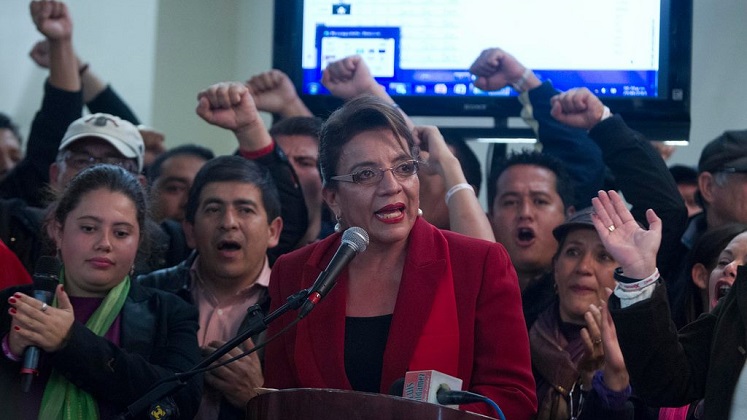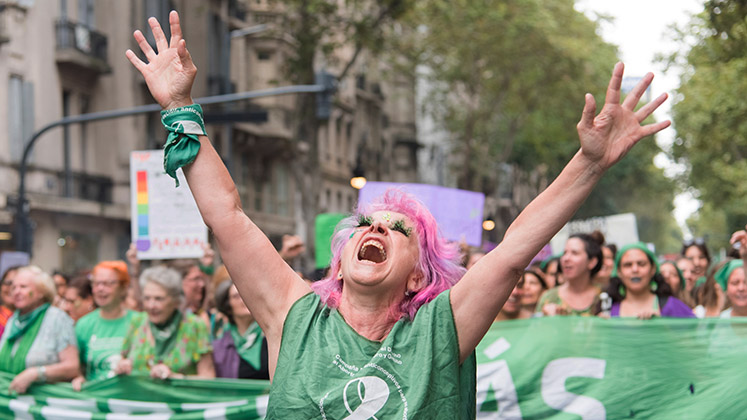Xiomara Castro takes office as president of Honduras at a time in which women remain absent from Latin America’s executive powers. Her victory represents a leader with her own voice. If her coalition respects the government’s programme, which has its motto “Nothing about us, without us”, women’s opportunities could improve in the country, writes Flavia Freidenberg (UNAM and Red de Politólogas).
Xiomara Castro has become the first female president of Honduras after the elections in November 2021, ending twelve years of the National Party’s (PN) conservative government. At a time in which women are absent from Latin America’s executive powers, Castro’s election is historic. With 1,716,793 of the valid votes (51.12%), her success is revolutionary, as she has brought her leftist party, Libertad y Refundación (“Libre”), back to power after the coup against her husband, former president Manuel Zelaya, in 2009. While many want to see her as a mere extension of her husband, the former first lady became a leader with a distinct voice. Castro has led the anti-coup protests and mobilised large parts of the country, favouring her party’s presidential bid in 2013 and 2021 and vice-presidential bid in 2017.
A victory amidst backlash over women’s leadership
The results of these elections took on particular relevance because of the contested nature of the female candidate against the status quo in a country dominated by traditional parties, which have held power for more than two hundred years as if they were caciques. The 2017 election process was contentious: there were demands for change following allegations of fraud, twenty people killed and widespread popular discontent. Today, Castro assumes the challenge of governing a country plagued by the economic crisis, structural poverty and migration; corruption and inequality; insecurity, militarisation and extreme distrust of the political class and its capacity to generate collective well-being. Moreover, in 2018, close to 50 per cent of the Honduran population said they did not live in a democracy.
Castro’s success has also been significant in terms of gender equality, because of the obstacles that Honduran women often face when trying to access or hold a position of popular representation. Even though women are the majority of party militants and the highest voters in elections, the spaces of power are often unfriendly to them. Honduras is the country with the highest femicide rates in Latin America; it is one of the most conservative, and political parties act as the main gatekeepers for women’s participation. When I conducted interviews with the leadership of the traditional parties (National and Liberal) in 2018, their leaders expressed rejection of women’s leadership. They were uncomfortable were uncomfortable with my interest in the subject and reproduced sexist and discriminatory stereotypes against the possibility of women in decision-making positions.
Although the number of women in legislative seats has increased since the installation of democracy in 1980, only 169 women have been elected in the entire recent democratic history (1980-2021), compared to 1,071 male legislators. In the last term in office, only 21.1 per cent of seats were held by women, according to ECLAC, and the new legislative composition is not very different from past experiences. Although women expect to compete on equal terms with men, in practice, they live in a cultural context that underestimates their abilities. Proof of this has been the violent campaign against Castro’s candidacy based on hatred, discrimination and fear.
In that sense, the election of the new president was not matched with an overwhelming presence of women legislators; neither it has eradicated its abusive practices nor avoided three of the myths that have been a constant in the Honduran electorate. These include the belief that women are not qualified to govern; a vision that society is not ready to be governed by female leaders; and the idea that women politicians who manage to reach positions of power must have exceptional capacities.

A triple institutional lock
Why does legislative representation never exceed 26 per cent of women if gender parity is required? Honduras suffers from a triple institutional lock that limits the election of women, which is evidenced by three facts. First, equality is necessary for the primary elections rather than in the final vote. This acts as a safety net and allows parties not to comply with the law. On the other hand, even though the rule establishes alternating positions between male and female candidates, this does not work in practice as a zip but instead allows one woman to be placed every fifth place on the list. Finally, the electoral system does not contribute to the election of women, given that preferential voting (or election by person) makes the electorate’s choice of male candidates for positions of popular representation easier.
Political parties pretend to respect the law, but, in practice, they engage in gender-based political violence. They do so because their actions have no legal or political costs against them. They do it because they can. The draft bill against violence against women in politics has been in a drawer for years, and there has been no will to pass it, even though this has already happened in ten Latin American countries. Neither citizens seem to care that women are systematically excluded from decision-making. If voters used their power at the ballot box to punish leaders who abuse women, they would be more likely to refrain from violence.
Nothing about us, without us. The pending reforms
The new Congress will have to follow up on the changes pending after the recent electoral reform of 2020/2021. Among its many priorities, the discussion and approval of a deep reform on women’s political participation and representation, including the requirement of gender parity in general elections, with balanced lists of one man-one woman-one man or vice versa, and full ticket ( candidates and alternates of the same gender), as well as the approval of the law against gender-based political violence, are among the most important.
The current design does not work, and therefore it is urgent to break the institutional triple lock. If the winning coalition respects its government programme and its manifesto, “Nothing about us, without us”, women’s opportunities could improve. The big question for the coming months will be to what extent Xiomara Castro will be able to promote policies that tackle the unresolved issues concerning women, and that she will do so by pushing a feminist agenda.
Notes:
• Translation by Maria Clara Montoya
• The views expressed here are of the author rather than the Centre or the LSE
• Please read our Comments Policy before commenting
• Banner image: Davide Bonaldo / Shutterstock





